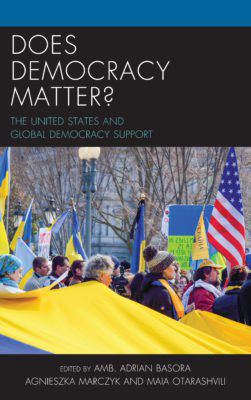A nation must think before it acts.
About the Book
Confidence in the future of democracy has been shaken by the authoritarian resurgence of the past decade, and some now argue that it is not realistic for the U.S. to continue to champion democracy abroad. Does Democracy Matter? provides the conclusions of eleven scholars and practitioners from widely different backgrounds who ask whether and, if so, how the U.S. should support democracy beyond its own borders. Although all of the authors agree that American strategic interests are better served in the long run by the consolidation and spread of democracy abroad, they differ as to the role that democracy support should play in the overall U.S. national security calculus. They also discuss how and where—if at all—such assistance should be delivered. In the concluding chapter, two former American ambassadors lay out a system of “triage” designed to ensure that U.S. democracy assistance is targeted in a way that is effective and contributes to our overall security and prosperity as a nation.
Discussion Questions: The Big Picture
- Do you believe that the advancement of democracy abroad is a core U.S. national interest? Why or why not?
- How did you define a democratic state before reading this book? What do you see as the advantages and drawbacks of the approach to defining democracy discussed in the Introduction?
- How far has the authoritarian resurgence of the past decade progressed? What are the most significant examples of democratic erosion in the face of this counteroffensive?
- Please discuss Samuel Huntington’s thesis of “waves of democratization” and of “reverse waves.” Do you believe that we are now in a full reverse wave or simply a “democratic recession”?
- What methods are authoritarian leaders using to expand their power and to undermine existing democracies?
- In addition to this authoritarian offensive, what are the main problems that democracy is facing in its historic transatlantic heartland today?
- What are the most important short-term and long-term challenges to effective U.S. support for the consolidation and spread of democracy abroad?
- What are the main “soft power” approaches to democracy promotion and democracy assistance? Give at least 5 examples discussed in the book and discuss their uses and limitations.
- How do international norms on human rights and rule of law fit into the discussion about soft power?
- What key questions about democracy should scholars try to answer in studying today’s global competition between democracy and autocracy?
Discussion Questions: Individual Chapters
- In his chapter “Realist Counsel on Democracy Promotion,” Nikolas Gvosdev proposes that the United States government should develop a “triage” mechanism when it comes to democracy promotion abroad. How does Gvosdev characterize this mechanism? Do you find his argument compelling?
- How does the approach to triage used by Ambassadors Basora and Yalowitz in their Conclusions chapter differ from Gvosdev’s approach?
- In their chapters on nuts and bolts of democracy assistance, Sarah Bush and Melinda Haring identify specific problems with existing methods of U.S. democracy assistance and suggest alternatives. Based on both chapters, characterize the problems and challenges that currently impede effective U.S. democracy assistance abroad. What solutions do Bush and Haring propose? Do you think these solutions have the potential to be effective?
- In “Reviving the Democratic Momentum,” Larry Diamond cautions against abandoning newly established middle-income democracies too soon. What exactly is his argument? Do you find it persuasive?
- Diamond also argues:
Finally, the democracies of the world should bear in mind one thing, above all else. We have the better set of ideas. Democracy may be receding in practice, but it is still ascendant in peoples’ values and aspirations. Some people may accept authoritarian rule as a useful or necessary political order at a certain historical moment or phase of development. But aside from some self-serving rulers and ruling establishments, few people in the world today celebrate authoritarianism as a superior moral system, the ultimate destination, the best form of government.
Do you agree with this argument? If so, what evidence would you use to support it? What contrary evidence would you need to take into account? If you do not agree with Diamond, what evidence and arguments would you use to argue against his claim?
- In her review of scholarly literature on democratic transitions, Agnieszka Marczyk writes:
The most important finding regarding civil society—and one that holds throughout the world—is that democratic change initiated by broad-based, nonviolent mass movements is much more likely to result in lasting, durable democratization than change resulting from violent revolutions, coups, or any other form of overthrowing autocracy.
Find a few of the articles she cites in support of this statement and examine their methodology and evidence. Based on these studies and evidence, do you find the claim about the value of nonviolent democratic change persuasive?
Does Democracy Matter? The United States and Global Democracy Support is available for purchase on Amazon.





